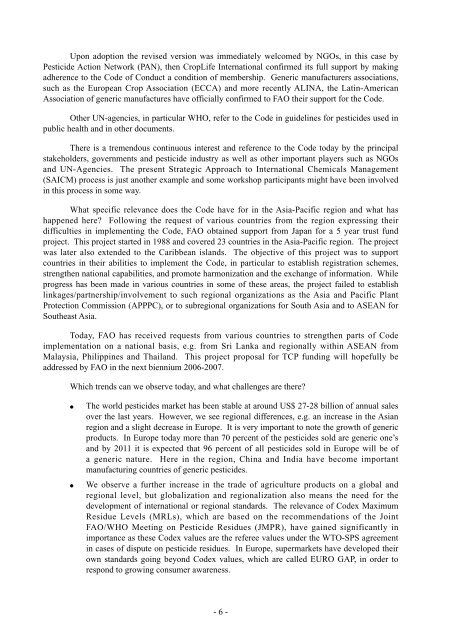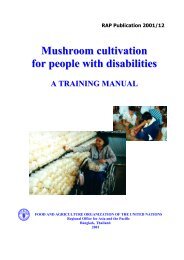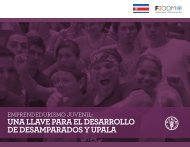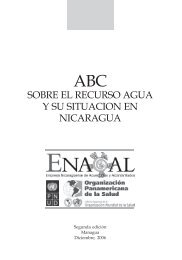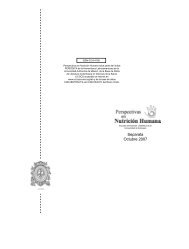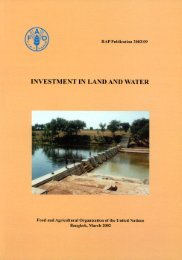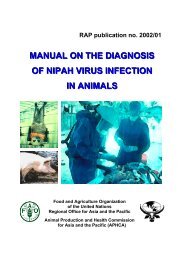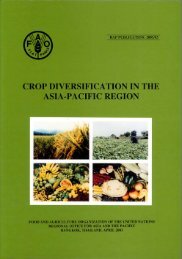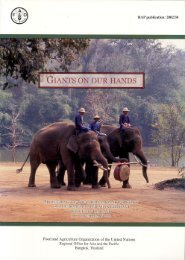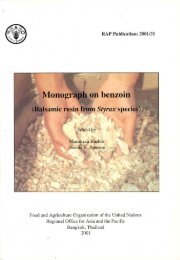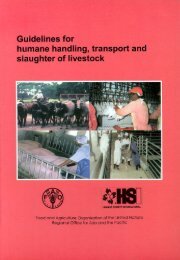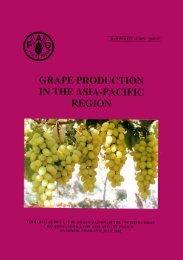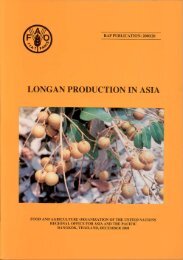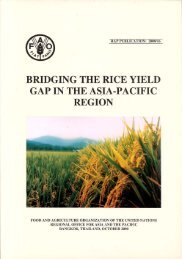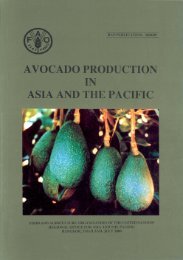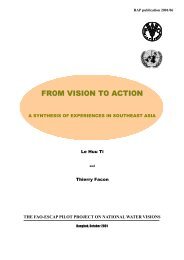Proceedings of the Asia regional workshop on the
Proceedings of the Asia regional workshop on the
Proceedings of the Asia regional workshop on the
Create successful ePaper yourself
Turn your PDF publications into a flip-book with our unique Google optimized e-Paper software.
Up<strong>on</strong> adopti<strong>on</strong> <str<strong>on</strong>g>the</str<strong>on</strong>g> revised versi<strong>on</strong> was immediately welcomed by NGOs, in this case by<br />
Pesticide Acti<strong>on</strong> Network (PAN), <str<strong>on</strong>g>the</str<strong>on</strong>g>n CropLife Internati<strong>on</strong>al c<strong>on</strong>firmed its full support by making<br />
adherence to <str<strong>on</strong>g>the</str<strong>on</strong>g> Code <str<strong>on</strong>g>of</str<strong>on</strong>g> C<strong>on</strong>duct a c<strong>on</strong>diti<strong>on</strong> <str<strong>on</strong>g>of</str<strong>on</strong>g> membership. Generic manufacturers associati<strong>on</strong>s,<br />
such as <str<strong>on</strong>g>the</str<strong>on</strong>g> European Crop Associati<strong>on</strong> (ECCA) and more recently ALINA, <str<strong>on</strong>g>the</str<strong>on</strong>g> Latin-American<br />
Associati<strong>on</strong> <str<strong>on</strong>g>of</str<strong>on</strong>g> generic manufactures have <str<strong>on</strong>g>of</str<strong>on</strong>g>ficially c<strong>on</strong>firmed to FAO <str<strong>on</strong>g>the</str<strong>on</strong>g>ir support for <str<strong>on</strong>g>the</str<strong>on</strong>g> Code.<br />
O<str<strong>on</strong>g>the</str<strong>on</strong>g>r UN-agencies, in particular WHO, refer to <str<strong>on</strong>g>the</str<strong>on</strong>g> Code in guidelines for pesticides used in<br />
public health and in o<str<strong>on</strong>g>the</str<strong>on</strong>g>r documents.<br />
There is a tremendous c<strong>on</strong>tinuous interest and reference to <str<strong>on</strong>g>the</str<strong>on</strong>g> Code today by <str<strong>on</strong>g>the</str<strong>on</strong>g> principal<br />
stakeholders, governments and pesticide industry as well as o<str<strong>on</strong>g>the</str<strong>on</strong>g>r important players such as NGOs<br />
and UN-Agencies. The present Strategic Approach to Internati<strong>on</strong>al Chemicals Management<br />
(SAICM) process is just ano<str<strong>on</strong>g>the</str<strong>on</strong>g>r example and some <str<strong>on</strong>g>workshop</str<strong>on</strong>g> participants might have been involved<br />
in this process in some way.<br />
What specific relevance does <str<strong>on</strong>g>the</str<strong>on</strong>g> Code have for in <str<strong>on</strong>g>the</str<strong>on</strong>g> <str<strong>on</strong>g>Asia</str<strong>on</strong>g>-Pacific regi<strong>on</strong> and what has<br />
happened here? Following <str<strong>on</strong>g>the</str<strong>on</strong>g> request <str<strong>on</strong>g>of</str<strong>on</strong>g> various countries from <str<strong>on</strong>g>the</str<strong>on</strong>g> regi<strong>on</strong> expressing <str<strong>on</strong>g>the</str<strong>on</strong>g>ir<br />
difficulties in implementing <str<strong>on</strong>g>the</str<strong>on</strong>g> Code, FAO obtained support from Japan for a 5 year trust fund<br />
project. This project started in 1988 and covered 23 countries in <str<strong>on</strong>g>the</str<strong>on</strong>g> <str<strong>on</strong>g>Asia</str<strong>on</strong>g>-Pacific regi<strong>on</strong>. The project<br />
was later also extended to <str<strong>on</strong>g>the</str<strong>on</strong>g> Caribbean islands. The objective <str<strong>on</strong>g>of</str<strong>on</strong>g> this project was to support<br />
countries in <str<strong>on</strong>g>the</str<strong>on</strong>g>ir abilities to implement <str<strong>on</strong>g>the</str<strong>on</strong>g> Code, in particular to establish registrati<strong>on</strong> schemes,<br />
streng<str<strong>on</strong>g>the</str<strong>on</strong>g>n nati<strong>on</strong>al capabilities, and promote harm<strong>on</strong>izati<strong>on</strong> and <str<strong>on</strong>g>the</str<strong>on</strong>g> exchange <str<strong>on</strong>g>of</str<strong>on</strong>g> informati<strong>on</strong>. While<br />
progress has been made in various countries in some <str<strong>on</strong>g>of</str<strong>on</strong>g> <str<strong>on</strong>g>the</str<strong>on</strong>g>se areas, <str<strong>on</strong>g>the</str<strong>on</strong>g> project failed to establish<br />
linkages/partnership/involvement to such <str<strong>on</strong>g>regi<strong>on</strong>al</str<strong>on</strong>g> organizati<strong>on</strong>s as <str<strong>on</strong>g>the</str<strong>on</strong>g> <str<strong>on</strong>g>Asia</str<strong>on</strong>g> and Pacific Plant<br />
Protecti<strong>on</strong> Commissi<strong>on</strong> (APPPC), or to sub<str<strong>on</strong>g>regi<strong>on</strong>al</str<strong>on</strong>g> organizati<strong>on</strong>s for South <str<strong>on</strong>g>Asia</str<strong>on</strong>g> and to ASEAN for<br />
Sou<str<strong>on</strong>g>the</str<strong>on</strong>g>ast <str<strong>on</strong>g>Asia</str<strong>on</strong>g>.<br />
Today, FAO has received requests from various countries to streng<str<strong>on</strong>g>the</str<strong>on</strong>g>n parts <str<strong>on</strong>g>of</str<strong>on</strong>g> Code<br />
implementati<strong>on</strong> <strong>on</strong> a nati<strong>on</strong>al basis, e.g. from Sri Lanka and <str<strong>on</strong>g>regi<strong>on</strong>al</str<strong>on</strong>g>ly within ASEAN from<br />
Malaysia, Philippines and Thailand. This project proposal for TCP funding will hopefully be<br />
addressed by FAO in <str<strong>on</strong>g>the</str<strong>on</strong>g> next biennium 2006-2007.<br />
Which trends can we observe today, and what challenges are <str<strong>on</strong>g>the</str<strong>on</strong>g>re?<br />
● The world pesticides market has been stable at around US$ 27-28 billi<strong>on</strong> <str<strong>on</strong>g>of</str<strong>on</strong>g> annual sales<br />
over <str<strong>on</strong>g>the</str<strong>on</strong>g> last years. However, we see <str<strong>on</strong>g>regi<strong>on</strong>al</str<strong>on</strong>g> differences, e.g. an increase in <str<strong>on</strong>g>the</str<strong>on</strong>g> <str<strong>on</strong>g>Asia</str<strong>on</strong>g>n<br />
regi<strong>on</strong> and a slight decrease in Europe. It is very important to note <str<strong>on</strong>g>the</str<strong>on</strong>g> growth <str<strong>on</strong>g>of</str<strong>on</strong>g> generic<br />
products. In Europe today more than 70 percent <str<strong>on</strong>g>of</str<strong>on</strong>g> <str<strong>on</strong>g>the</str<strong>on</strong>g> pesticides sold are generic <strong>on</strong>e’s<br />
and by 2011 it is expected that 96 percent <str<strong>on</strong>g>of</str<strong>on</strong>g> all pesticides sold in Europe will be <str<strong>on</strong>g>of</str<strong>on</strong>g><br />
a generic nature. Here in <str<strong>on</strong>g>the</str<strong>on</strong>g> regi<strong>on</strong>, China and India have become important<br />
manufacturing countries <str<strong>on</strong>g>of</str<strong>on</strong>g> generic pesticides.<br />
● We observe a fur<str<strong>on</strong>g>the</str<strong>on</strong>g>r increase in <str<strong>on</strong>g>the</str<strong>on</strong>g> trade <str<strong>on</strong>g>of</str<strong>on</strong>g> agriculture products <strong>on</strong> a global and<br />
<str<strong>on</strong>g>regi<strong>on</strong>al</str<strong>on</strong>g> level, but globalizati<strong>on</strong> and <str<strong>on</strong>g>regi<strong>on</strong>al</str<strong>on</strong>g>izati<strong>on</strong> also means <str<strong>on</strong>g>the</str<strong>on</strong>g> need for <str<strong>on</strong>g>the</str<strong>on</strong>g><br />
development <str<strong>on</strong>g>of</str<strong>on</strong>g> internati<strong>on</strong>al or <str<strong>on</strong>g>regi<strong>on</strong>al</str<strong>on</strong>g> standards. The relevance <str<strong>on</strong>g>of</str<strong>on</strong>g> Codex Maximum<br />
Residue Levels (MRLs), which are based <strong>on</strong> <str<strong>on</strong>g>the</str<strong>on</strong>g> recommendati<strong>on</strong>s <str<strong>on</strong>g>of</str<strong>on</strong>g> <str<strong>on</strong>g>the</str<strong>on</strong>g> Joint<br />
FAO/WHO Meeting <strong>on</strong> Pesticide Residues (JMPR), have gained significantly in<br />
importance as <str<strong>on</strong>g>the</str<strong>on</strong>g>se Codex values are <str<strong>on</strong>g>the</str<strong>on</strong>g> referee values under <str<strong>on</strong>g>the</str<strong>on</strong>g> WTO-SPS agreement<br />
in cases <str<strong>on</strong>g>of</str<strong>on</strong>g> dispute <strong>on</strong> pesticide residues. In Europe, supermarkets have developed <str<strong>on</strong>g>the</str<strong>on</strong>g>ir<br />
own standards going bey<strong>on</strong>d Codex values, which are called EURO GAP, in order to<br />
resp<strong>on</strong>d to growing c<strong>on</strong>sumer awareness.<br />
- 6 -


